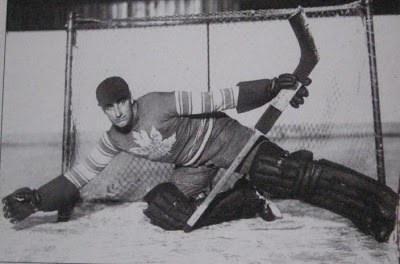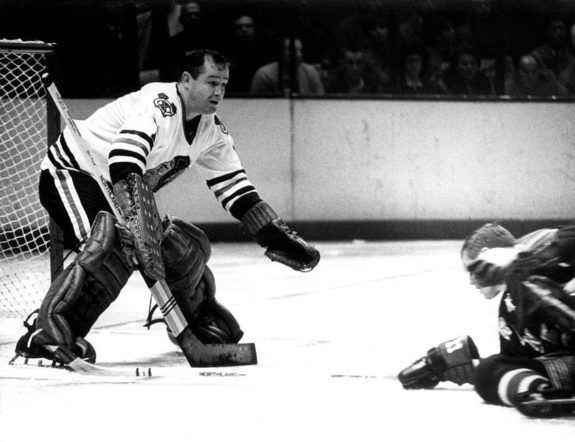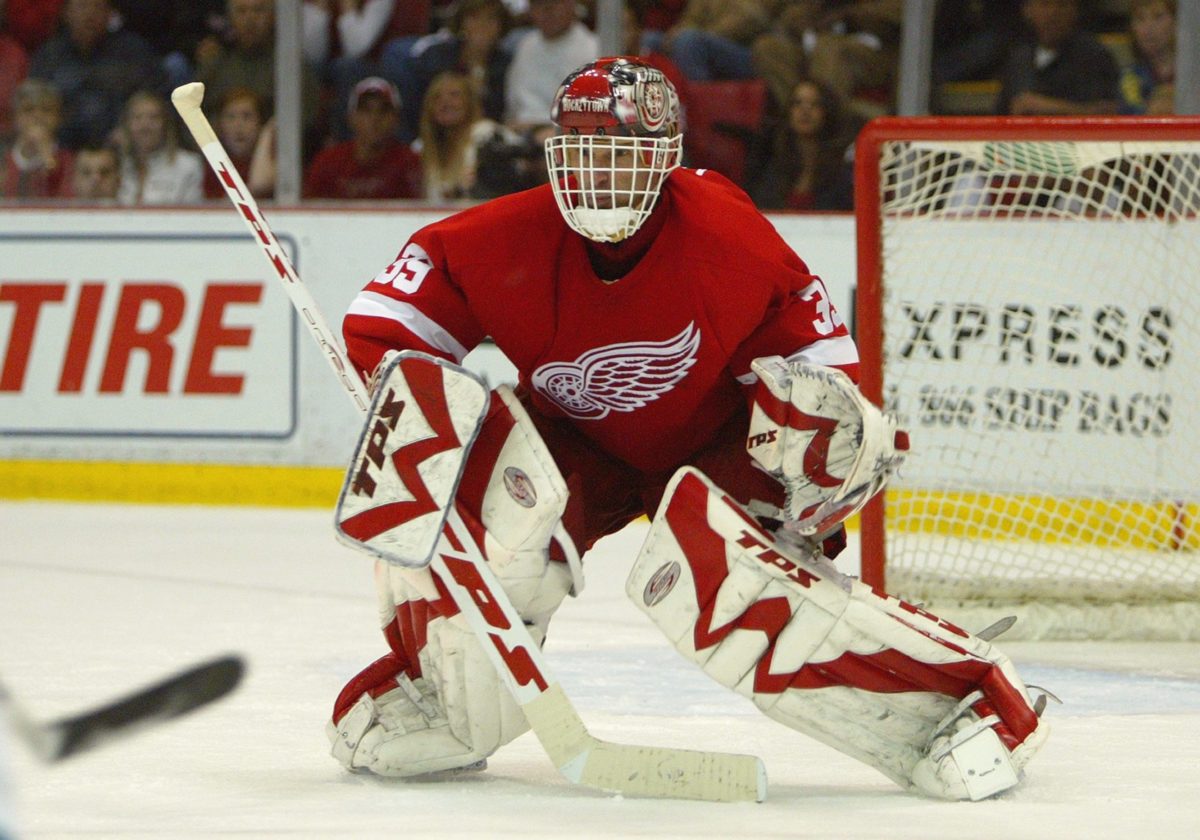The Vegas Golden Knights kicked off their offseason by trading goaltender Marc-Andre Fleury to the Chicago Blackhawks. The move came less than a month after 36-year-old won the Vezina Trophy for being voted the best goaltender of the 2020-21 season. He went 26-10-6 during the regular season with a 1.98 goals-against average (GAA) and .928 save percentage (SV%). Not only did they trade the reigning Vezina winner, but all they got in return was a low-end prospect in Mikael Hakkarainen in an obvious salary dump.
Related – Golden Knights’ Disrespect of Fleury Continues
If you think it is rare for a reigning Vezina winner to switch teams, you’d be surprised about how many times it has happened. Fleury is the seventh goaltender to switch teams within a year after being named the best at his position. Here is a look back at the other six who moved on after an award-winning season.
Lorne Chabot, 1935 Winner
Chabot’s lone season with the Blackhawks was a memorable one. After winning the Stanley Cup with the Toronto Maple Leafs in 1928 and 1932, he was traded to the Montreal Canadiens in 1933 for Hall of Fame netminder George Hainsworth. He was moved to the Blackhawks after one season with the Habs. He started in all 48 regular-season games during the 1934-35 season. He went 26-17-5 with a 1.80 GAA and eight shutouts. However, the defending Stanley Cup championship lost in the quarterfinals to the Montreal Maroons.

The following season, Chabot was suspended by the Blackhawks for refusing to report to the minor leagues. Eventually, he was traded back to the Canadiens for cash. They then flipped him to the Maroons for Bill Miller, Toe Blake, and the rights to Ken Grivel. He went 8-3-5 for the Maroons with a 2.08 GAA. They traded Chabot to the New York Americans for cash just before the 1936-37 season, where he played the final six games of his career.
Terry Sawchuk, 1955 Winner
Before Patrick Roy and Martin Brodeur arrived, Sawchuk was the standard all NHL goaltenders were held to. He won 455 games and four Stanley Cups during his 21-season career. He won his third Vezina trophy in four seasons with the Detroit Red Wings in 1955. He amassed a 40-17-11 record with a 1.96 GAA and a league-leading 12 shutouts. He went 8-3 in the postseason to lead the Red Wings to back-to-back Stanley Cup wins.
The Red Wings had an up-and-coming goaltender in minor leagues named Glenn Hall (more on him in a minute), so after the season, they traded Sawchuk, with Marcel Bonin, Lorne Davis, and Vic Stasiuk to the Boston Bruins for Gilles Boisvert, Real Chevrefils, Norm Corcoran, Warren Godfrey, and Ed Sandford.
Sawchuk’s time in Boston was a major disappointment as his numbers suffered due to admittedly being devastated by the trade and a severe case of mononucleosis. However, the Bruins made out like bandits when they traded him back to Detroit for Johnny Bucyk, who scored the most goals in franchise history. Sawchuk played seven more seasons with the Red Wings before being claimed by the Maple Leafs in the 1964 Intra-League Draft. He won the fourth and final Vezina Trophy of his career in his first season in Toronto.
Glenn Hall, 1967 Winner
After spending two seasons as the starter with the Red Wings, Hall was traded to the Blackhawks in 1957, where he solidified his Hall of Fame resume. He won his second Vezina Trophy in Chicago for going 19-5-5 with a 2.38 GAA during the 1966-67 season. This was back when the Vezina was given to the goaltender(s) on the team that allowed the fewest goals, so he split the award with Denis DeJordy.

On June 6, 1967, Hall was selected by the St. Louis Blues in the first Expansion Draft as the NHL expanded from six to 12 teams. He had four solid seasons with the Blues, leading them to three straight Stanley Cup Final appearances and winning the Conn Smythe Trophy in 1968 and a third Vezina in 1969.
Michel Larocque, 1981 Winner
Larocque might be the least-known Vezina winner on this list. He spent the majority of his career as Ken Dryden’s backup during the Canadiens 1970s dynasty. He and Dryden won the Vezina in 1977, 1978, and 1979. He was part of the trio of goaltenders who won the award for Montreal in 1981, sharing it with Denis Herron and Richard Sevigny. This was last season before the NHL adopted the current criteria to win the trophy.
During this Vezina-winning season, Larocque was traded to the Maple Leafs for defenseman Robert Picard. He played in parts of three seasons in Toronto, going 16-35-13 with a 4.80 GAA and .859 SV%; hardly the numbers who’d expect out of a Vezina winner these days.
Jim Carey, 1996 Winner
Carey busted onto the scene during the 1994-95 season with the Washington Capitals when he went 18-6-3 during the first 28 games of his career. He proved that was no fluke by winning the 1996 Vezina for going 35-24-9 with a .906 SV%, 2.26 GAA, and a league-leading nine shutouts.
Midway through the following season, Carey was part of a blockbuster trade. The Capitals dealt him, Jason Allison, Anson Carter, and a third-round pick (Lee Goren) for forwards Adam Oates, Rick Tocchet, and goaltender Bill Ranford. Carey never regained his Vezina-winning form with the Bruins and was eventually sent down to the minor leagues during the 1997-98 season. He made four final appearances for the Blues during the 1998-99 season but was out of the NHL at 24, just three years removed from being voted the best goaltender in the league.
Dominik Hasek, 2001 Winner
You earn the nickname “The Dominator” just because it sounds cool. It was the perfect way to describe Hasek’s play with the Buffalo Sabres. He won six Vezina Trophies in an eight-season span, including three in a row between 1997 and 1999. His sixth and final career Vezina win came following the 2000-01 season where in went 37-24-4 with a .921 SV%, 2.11 GAA and 11 shutouts.

On July 1, 2001, in a move to lower payroll, the Sabres traded Hasek to the Red Wings for a first-round draft pick and Vyacheslav Kozlov. During his first season in Detroit, he won a career-high 41 games while posting a .915 SV% and 2.17 GAA. He turned it up a notch in the postseason. In 23 playoff games, he had a .920 SV%, 1.86 GAA, and earned six shutouts as he finally won the one trophy that had eluded him, the Stanley Cup.
Time will tell how trading Fleury away for cap space will affect both the Golden Knights and Blackhawks. Vegas still has a solid starting goaltender in Robin Lehner. Meanwhile, in Chicago, the team awaits to hear if the veteran goaltender will even report to training camp. He has been contemplating retirement over moving his family to a new city for one season, but it appears that he will wear a Blackhawks sweater this season. Moving on from a Vezina-winning netminder doesn’t always work out, and it will be interesting to see exactly how this situation plays out.